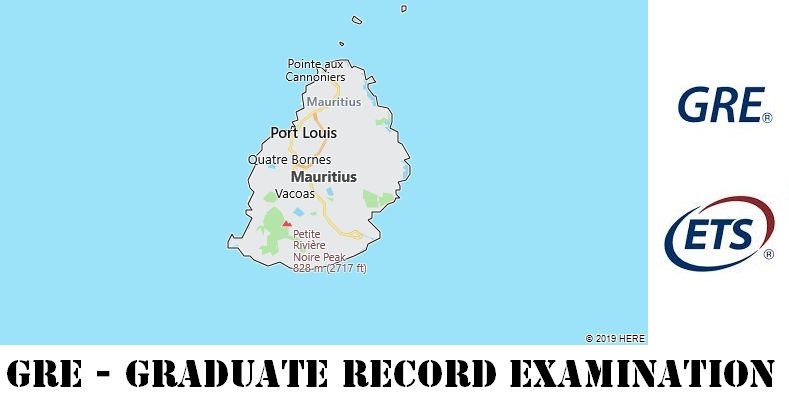GRE Testing Locations
Decided to take GRE exam? Now it is time to determine where to take the test. This site provides a full list of GRE testing centers in Mauritius, among which, you can choose one that is nearest to you. Good news is that the following GRE test locations in Mauritius offer both GRE general test and the GRE subject tests.
Paper-delivered Test Centers for General Test
| Code | Name |
| 10560 | Port Louis, ICCF6 |
GRE Test Dates
There are two types of test format offered by the test maker – ETS: Computer-delivered and Paper-delivered GRE general tests. For computer based test format, the GRE General Test is offered year-round on a continuous basis, and available for registration on a first-come, first-served basis. For paper based general test, testing is available three times per year. The following test dates apply:
| Test Dates for Paper Based | Deadlines for Registration | Scores Available |
|---|---|---|
| November 09, 2019 | October 4, 2019 | December 20, 2019 |
| February 1, 2020 | December 27, 2019 | March 13, 2020 |
GRE Subject Tests in Mauritius
The GRE Subject Tests are available on paper based only. In all GRE test centers throughout the world (both inside and outside United States), the exam is available three times a year. The three test dates are:
- April
- September
- October

More about Mauritius
History
The island, already known to the Arabs and Malays, was discovered around 1510 by the Portuguese Pedro de Mascarenhas (* 1483; † 1555). It was owned by the Netherlands from 1598 to 1710 and was named after Moritz (Maurits), Prince of Orange during this time. Since 1715 Mauritius was called Île de France French, British colony since 1810. After the abolition of slavery in 1832, Indians immigrated from 1835, mainly working on the sugar cane plantations. In the general elections of 1948, the Parti Travailliste (PTr) appeared for the first time as a political force of the predominantly Indian lower class, while the French-speaking upper class founded the Parti Mauricien Social-Démocrate (PMSD) in 1955. Mauritius was given autonomy in 1958 and independence on March 12, 1968, but remained Dominion. First Prime Minister was Seewoosagur Ramgoolam (* 1900, † 1985; PTr Chairman); from 1976 PTr and PMSD formed a coalition government.
In 1982 an alliance of left-wing parties around the Mouvement Militant Mauricien (MMM) won a major election and put the government under Prime Minister A. Jugnauth. After the split in the MMM in 1983, a ruling coalition took over power, which was confirmed in the 1987 elections but disintegrated in 1988; However, Jugnauth remained Prime Minister. He went out of the 1991 elections, supported by an alliance v. a. between his own party MSM and the MMM, once again emerged victorious.
On March 12, 1992, the Republic of Mauritius was proclaimed, but it remained part of the Commonwealth of Nations. In June 1992 the National Assembly elected Cassam Uteem (* 1941; MMM) as President. In early parliamentary elections in December 1995, an alliance of MMM and PTr won. The previous opposition leader and PTr chairman Navin Ramgoolam (* 1947) was the new Prime Minister of the coalition government, Son of the first prime minister after independence. The parliamentary elections in September 2000 were won by an alliance of MMM and MSM. The planned introduction of a law to combat international terrorism led to heated internal political discussions at the beginning of 2002, as it was feared that civil rights and freedoms would be restricted. President Uteem refused to sign this law and then resigned. On February 25, 2002, Karl Offmann (* 1940; MMM) was elected President of the State by the National Assembly. On 30 9, 2003, the MMM-chairman sparked Paul Bérenger (* 1945) in accordance with an agreement reached before the 2000 parliamentary elections, the incumbent since these elections Jugnauth (MSM Chairman) from Prime Minister; Bérenger was the first non-Hindu at the head of the government since independence in 1968. On the basis of this agreement of 2000, Jugnauth was elected as the new president on October 7, 2003. After the parliamentary elections in July 2005, N. Ramgoolam (PTr) became the new Prime Minister, who had held this post from 1995-2000.
In 2008 the parliament confirmed Jugnauth in the presidency. The Alliance de l’Avenir (PTr, MSM, PMSD) led by Ramgoolam won the 2010 parliamentary elections with a clear majority and secured 45 seats. Ramgoolam was able to continue the government work as Prime Minister. After disputes over allegations of corruption, the MSM withdrew from the cabinet in July 2011. In March 2012, President Jugnauth resigned after disputes with the head of government, creating the option of running for prime minister in the next elections. On July 21, 2012, the PTr politician Rajkeswur Purryag took over (* 1947) the presidency. In June 2014, the PMSD also left the government. The Alliance Lepep (MSM, PMSD, ML), led by A. Jugnauth, clearly won the parliamentary elections on December 10, 2014 with 49.8% of the votes and 51 out of 69 seats. The MMM / PTr alliance led by N. Ramgoolam received 38.5% of the vote and 16 seats in parliament. Jugnauth was sworn in on December 17, 2014 in the office of Prime Minister. As a result of the change of government, President Rajkeswur Purryag resigned on May 29, 2015 in consultation with Jugnauth. On June 4, 2015, the parliament appointed Ameenah Gurib-Fakim,professor of chemistryto his successor. She was sworn in on June 5, 2015. This was the first time that a woman was elected head of state of Mauritius. Prime Minister A. Jugnauth resigned from office on January 23, 2017 for reasons of age. He was succeeded as head of government by his son Pravind Jugnauth (* 1961). In connection with a billing scandal, President Gurib-Fakim resigned on March 23, 2018. According to the constitution, Vice President Parasivum Pillay Vyapoory (MSM) took over her official duties.

